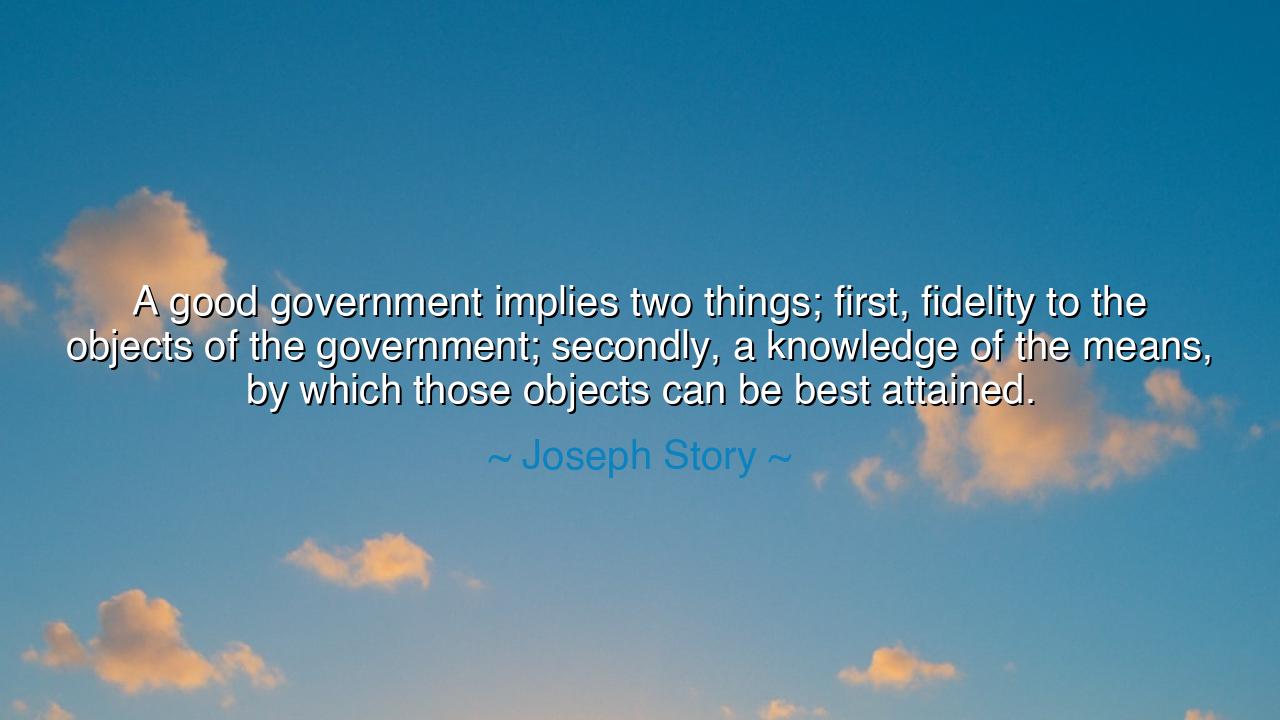
A good government implies two things; first, fidelity to the
A good government implies two things; first, fidelity to the objects of the government; secondly, a knowledge of the means, by which those objects can be best attained.






“A good government implies two things; first, fidelity to the objects of the government; secondly, a knowledge of the means, by which those objects can be best attained.”
Thus spoke Joseph Story, one of the great jurists of early America — a man whose wisdom flowed not from ambition but from reflection, not from power but from principle. In these words, he lays down a timeless measure of governance, one that transcends nations and centuries. He tells us that a government, to be truly good, must unite fidelity with knowledge — the purity of purpose with the skill of execution. The one without the other is but a hollow shell: fidelity without wisdom becomes blind zeal, and knowledge without virtue becomes corruption. Only when both dwell together, like justice and mercy in harmony, can the state stand firm and fulfill its sacred duty to the people.
When Story speaks of “fidelity to the objects of the government,” he speaks of loyalty not to men, nor to factions, nor to transient passions, but to the eternal objects — the true purposes — for which government exists. These are not to enrich the few, nor to dominate the many, but to protect liberty, to secure justice, and to preserve peace. Fidelity means faith — faithfulness to the Constitution, to the moral law, to the welfare of the people. A ruler who forgets these objects, however clever or powerful, builds his throne upon sand. Fidelity is the soul of governance — the unseen flame that guides the state through the storms of ambition and intrigue. Without it, a nation loses not merely its direction, but its heart.
Yet, Story warns that fidelity alone is not enough. Noble intentions must be joined with knowledge — with understanding of the “means by which those objects can be best attained.” The path to justice is not found by passion, but by wisdom; the preservation of freedom requires not only love for liberty, but knowledge of how to guard it. Many have fallen by believing that good motives alone would save them. But a sailor who loves the sea yet knows not the stars will wreck his ship; so too, the leader who clings to ideals but scorns knowledge will steer his nation into ruin. A good government, therefore, must be both moral and intelligent — guided by conscience and informed by experience.
The origin of this quote lies in the early years of the American Republic, when the new nation sought to understand what kind of government could preserve both order and freedom. Joseph Story, a justice of the U.S. Supreme Court and a scholar of constitutional law, saw in his time both the promise and peril of democracy. He understood that liberty without structure leads to anarchy, and structure without virtue leads to tyranny. Thus, his teaching was a plea for balance — for governments led by men of principle and prudence, who would neither betray their people’s trust nor misapply their people’s power. His wisdom stands as a compass not only for America but for all nations that seek to govern wisely and well.
History itself offers proof of Story’s truth. Consider the tale of George Washington, who embodied both fidelity and knowledge. In him, the ideals of freedom burned brightly — his fidelity to the “objects of government” was absolute. Yet he was not ruled by emotion or pride. He sought counsel, studied the art of statecraft, and governed with restraint. When offered kingship, he refused; when victory tempted vengeance, he chose mercy. His fidelity gave him moral authority, and his knowledge gave him the means to preserve it. Through that union, he became not the ruler of a people, but their servant — and in his service, he became immortal.
But contrast him with those rulers throughout history who have possessed one virtue but lacked the other. The visionary without knowledge becomes a dreamer, and the tactician without virtue becomes a tyrant. Fidelity without wisdom blinds the righteous; wisdom without fidelity corrupts the cunning. The one destroys through folly, the other through deceit. Only in their union can government achieve what it was created for: to protect, to uplift, and to endure. Thus, Story’s teaching is not merely a lesson in politics, but a lesson in life — for every man and woman governs something: a home, a duty, a conscience.
Therefore, O seeker of truth, take this teaching into your heart: whether you lead a nation, a family, or your own soul, strive for both fidelity and knowledge. Be steadfast in your purpose, but wise in your methods. Let your heart be pure and your mind discerning. Do not be swayed by passion alone, nor paralyzed by intellect alone. The harmony of the two is the mark of greatness. Seek always the object of your duty — justice, peace, and truth — and study diligently the means by which they may be achieved.
For as Joseph Story reminds us, the strength of any government — and indeed, of any soul — lies not merely in what it desires, but in how it acts. Fidelity without wisdom is like a flame without oil; knowledge without fidelity is like a sword without a hand to guide it. But when both burn together, they light the world with the steady fire of righteous purpose. And in that light, both nations and individuals may find the true path — the path of wise and faithful governance, the path that leads from justice to peace, and from peace to enduring glory.






AAdministratorAdministrator
Welcome, honored guests. Please leave a comment, we will respond soon